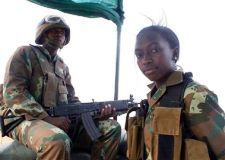African troops call for support, not replacement, in Darfur
Oct 13, 2006 (MALHA, Sudan) — African Union commanders are clinging to the hope that their peacekeeping troops can quell the increasing violence in Darfur, saying it’s time for Africans to solve African problems. Yet without more international support, those commanders say, their mission could fail as the bloodshed worsens.
 More than 200,000 people have been killed and 2.5 million displaced in Darfur since 2003, when rebels rose up against the central Sudanese government. The AU troops, sent by 25 African countries, were first deployed in 2004 but have failed to stop the fighting.
More than 200,000 people have been killed and 2.5 million displaced in Darfur since 2003, when rebels rose up against the central Sudanese government. The AU troops, sent by 25 African countries, were first deployed in 2004 but have failed to stop the fighting.
Many observers have criticized the understaffed and ill-equipped AU force of 7,000, saying it has done little to stem the violence in Sudan’s western Darfur region, which is about three-quarters the size of Texas. They say only a U.N. force can mitigate the AU’s inefficiency, weak mandate and lack of resources.
But Sudanese President Omar al-Bashir has staunchly rejected a U.N. Security Council resolution calling for a U.N. peacekeeping force to replace the AU troops in Darfur. Instead, he allowed the AU’s mandate to be extended until the end of the year.
The AU said it has 3,000 more troops ready to come to Darfur — but not the money to bring them — and many of the mission’s soldiers remain optimistic that their force will prevail.
“It’s high time for Africans to solve the continent’s problems. I know we can do it,” said Maj. Johannes Mkhabela.
The challenges, however, are daunting. In northern Darfur, a South African contingent of 400 combatants and 100 unarmed observers must patrol a vast area of 13,260 square miles — larger than Maryland — and protect tens of thousands of refugees.
“The mandate is clear,” Col. Francis Lourens, the contingent’s commander, told troops Thursday at the outpost of Malha, the AU’s northernmost position in Darfur. “Negotiate, mediate, and arbitrate. But if they shoot at you, shoot them down.”
About 5,000 government soldiers also are deployed in this region. Some 2,000 Janjaweed pro-government Arab militia are here, too, giving chase to about an equal number of rebels, themselves split in factions that regularly clash.
The Sudanese army allows AU troops to move somewhat freely in the areas of Darfur it controls, but rebel factions have made three-quarters of Lourens’ large sector off limits to peacekeepers, he said.
Rebels have grown increasingly hostile to AU troops after one rebel faction signed a peace agreement with the government in May. Those groups believe the AU has sided with the signatories, and Lourens said his troops are regularly ambushed.
“We are on high alert, but there have been no causalities on our side so far,” he said.
But the peacekeepers’ efforts to help refugees in the northern region have been stifled. They used to conduct “firewood patrols,” accompanying refugee women on outings for supplies to protect them from Janjaweed attacks. But the patrols ceased after the AU troops were ambushed recently by rebels hiding among the women.
“Right now, our mandate cannot be truly fulfilled. We don’t even have freedom of movement,” Lourens said.
In some areas, patrols have stopped altogether because there’s no gas for vehicles. Troop morale is also low among some of the soldiers, who are still waiting to be paid salaries from August, Lourens said.
The AU has said the mission costs about $25 million a month to operate. Officials have said it struggles to receive contributions from international donors on time and that it needs much more cash and equipment to be effective.
But it appears that some help is on the way. Though al-Bashir has rejected accepting U.N. peacekeepers, the world body is sending more than 100 military and civilian advisers to reinforce the AU mission.
There is no alternative to success, officials say. If the AU leaves, civilians would be abandoned. “This area would become a bloodbath within a week,” Lourens said.
(AP/ST)
